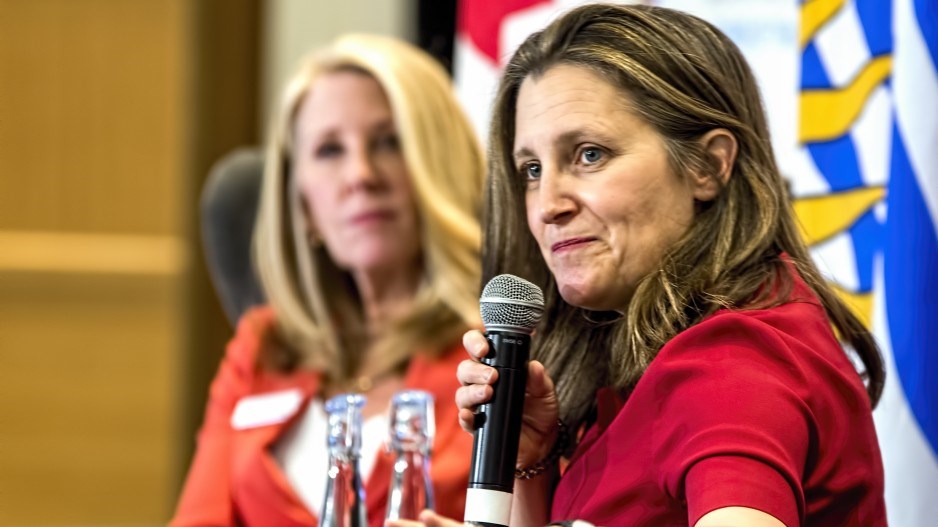Canadian Finance Minister Chrystia Freeland acknowledged Wednesday that Canada has a problem with business confidence, reflected in low business investment and productivity.
Numerous lingering and new economic challenges, from inflation to the war in Ukraine, add uncertainty.
In a talk with business leaders in Vancouver Wednesday, Freeland spoke about how her latest budget addresses some of those productivity concerns with federal funding that helps de-risk private investment, especially in areas related to a clean energy transition.
She said B.C.’s clean-tech and mining sectors in particular are well-poised to capitalize on federal programs funded in her recent budget.
“There are forecasts that we will have, and do have, the lowest productivity (in) the world,” said Bridgitte Anderson, president of the Greater Vancouver Board of Trade (GVBOT), which hosted Freeland in a post-budget discussion Wednesday. “So how do you see this innovation agency moving the dial on that?”
“The area that we can’t seem to get right is to drive productivity,” Freeland admitted. “We are falling behind our peers.”
She also said that the war in Ukraine, which is adding to high oil prices and inflation, adds to the uncertainty that may affect investor confidence.
“The world is a more dangerous place,” she said.
Freeland’s recent budget earmarks $15 billion for the Canada Growth Strategy, roughly $12 billion in spending and incentives for decarbonization and clean growth, and $3.8 billion for a new Critical Minerals Strategy.
Freeland said the $15 billion growth strategy aims to “crowd in private investment in the green transition – at least three private dollars for every federal dollar.”
She added that the federal government will retain equity stake in the companies it invests in.
“We need so much money to accomplish this huge green transformation,” Freeland said. “The government can’t, and shouldn’t, do it itself.
“There’s a huge amount of private capital in Canada and the world that wants to be involved. But these are risky investments. So what the federal government can do is help to de-risk those investments and pull in the private capital we need.”
She said a new investment tax credit for carbon capture and storage will be a boon for B.C. clean-tech companies in the carbon capture space, and more generally the $15 billion Canada Growth Fund is also good for B.C.'s clean-tech sector.
“I am counting on B.C. companies to be the beneficiaries of this and be the investors in this fund,” Freeland said.
“You have a head-start. You have a head-start on the rest of the country. You have a head-start on the rest of the continent. And this is something we really want to help you build on.”
Likewise, B.C.’s mining and mineral exploration sector is expected to benefit from a critical minerals strategy designed to secure a domestic supply of metals like copper, nickel, lithium, cobalt, rare earths and uranium – all of which are critical to the energy transition.
“We need some minerals and metals which are in short supply, and many of them happen to be found here in Canada,” she said. “We need to get better at getting them out of the ground, processing them and turning them into the stuff that our economy and the world economy needs.
“What we’re hearing from our allies, they want to be able to buy this stuff from a reliable democracy that has high environmental standards. On critical minerals and metals, I'm counting on the miners of B.C. to really be stepping up here.”
One of the biggest concerns now facing Canadian businesses is inflation at rates that Canadians have not seen for a generation.
Freeland acknowledged that federal government spending during the pandemic would have contributed to inflation.
“We had spent an extraordinary amount of money to fight COVID,” she said.
But given the shock to Canada’s economy that the pandemic delivered, Freeland said she was “astonished” at how good Canada’s growth and employment numbers are.
“The economy shrank by 17% and 3 million Canadians lost their jobs,” she said. "That was a disaster.”
But Canada’s economy has bounced back better than expected.
“We have had an astonishing job recovery – the best in the G7,” she said. “When I look at the global chessboard, there is no piece I would like to be playing more than Canada.”
Thanks to immigration, she said Canada is literally growing.
“Probably our greatest economic competitive advantage is we’re growing,” Freeland said. “We have the fastest growing population in the G7. And in a world where all the industrialized economies are constrained by labour shortages, that is just a huge ace in the hole.”
But that growth in population adds strain to an already chronic housing shortage problem.
“If we're going to be a growing country, we need to build more homes, and we're just not doing it fast enough,” Freeland said.
Freeland’s budget earmarks $4 billion over five years for a new housing accelerator fund that aims to see 100,000 new housing units built. She noted, however, that addressing housing is not just a federal responsibility. All levels of government need to be involved in addressing housing shortages, including municipal governments, which are responsible for permitting.
“There are lots and lots of municipalities across the country that are ready to issue more housing permits, but their systems are not allowing them to issue permits as quickly as they would like,” she said.
She said $4 billion in funding for a housing accelerator is intended to remove some of the roadblocks.
“This is not something that the federal government can do alone,” Freeland said. “This needs to be a real national effort.”




